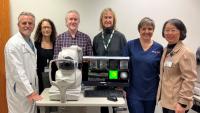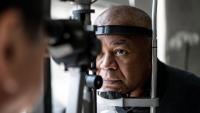CDC Vision Health Initiative Coordinating Center at Columbia University
Effectiveness of Telehealth-Based Programs to Detect Glaucoma Among High-Risk Populations in Community Health Settings

About Us
The Coordinating Center for the Vision Health Initiative has been awarded to Columbia University Department of Ophthalmology. In collaboration with CDC via a Collaborative Agreement (RFA-DP-24-081 Component B), the Coordinating Center (CC) for Evaluating the Effectiveness of Telehealth-Based Programs to Detect Glaucoma Among High-Risk Populations in Community Health Settings is co-led by Columbia University Ophthalmology faculty, Dr. Lisa A. Hark and Dr. Aakriti G. Shukla, a board-certified ophthalmologist and fellowship-trained glaucoma specialist.
The Vision Health Initiative
The Vision Health Initiative (VHI) at the Centers for Disease Control and Prevention aims to enhance public health surveillance and research that provides the basis for effective public health programs and policies to reduce the burden of vision loss. Estimates of the U.S. economic burden of vision loss nationally and by state can be examined on CDC’s Vision Loss Economic Explorer.
Leadership
Lisa A Hark, PhD, MBA
- Principal Investigator, Coordinating Center at Columbia University
- Professor of Ophthalmic Sciences (Ophthalmology)
- Chair, Website/Dissemination Working Group
![Lisa A Hark, PhD, MBA Profile Headshot]()
Aakriti Garg Shukla, MD, MSc
- Principal Investigator, Coordinating Center at Columbia University
- Associate Professor of Ophthalmology
- Chair, Clinical and Comparative-Effectiveness Working Group

Our Team
Prakash Gorroochurn, PhD
- Member, Clinical and Comparative Effectiveness Working Group
- Associate Professor of Biostatistics
- Mailman School of Public Health at Columbia University

Laura T. Pizzi, PharmD, MPH
- Health Economist and Advisor at Columbia University
- Member, Cost Effectiveness Working Group

Stefania C. Maruri, BS
- Coordinating Center Administrator at Columbia University
- Senior Research Worker, Department of Ophthalmology

Our Partners
VHI conducts and supports studies, in collaboration with partners, to enhance science and develop interventions to prevent vision loss, promote eye health, and address the social determinants of health to improve the health of communities that are underserved.
Awardees
To Evaluate the Effectiveness of Telehealth-Based Programs to Detect Glaucoma Among High-Risk Populations in Community Health Settings through innovative outreach and service delivery models, in 2024, VHI funded:
• University of Alabama at Birmingham
• University of Michigan
• Massachusetts Eye and Ear
• University of California San Francisco
Notice of Funding Opportunity (NOFO)
(RFA-DP-24-081) The purpose of this NOFO is to support comparative effectiveness trials to investigate the feasibility, effectiveness, and cost-effectiveness of telehealth-based interventions to detect and manage glaucoma among high-risk populations. This NOFO aims to support the study of replicable and scalable interventions that use real-world, payer-provider reimbursement structures within community-based, health care delivery settings in various regions of the United States. Outcomes should be relevant to clinical practice, public health, community implementation, and policy. This NOFO also supports the cost-effectiveness analyses of proposed interventions. The resulting data will assist policymakers, clinicians, and patients make informed decisions to reduce the burden of glaucoma and improve the quality of life for millions of people. This NOFO will be accomplished through two components, Component A: Comparative effectiveness trials among high-risk populations within community-based settings, and Component B: a coordinating center to provide scientific and logistical support to Component A studies.
Contact Us
If you have any questions about the Coordinating Center, or if you'd like to connect with our team, we're here to help. Please don’t hesitate to reach out to us!









